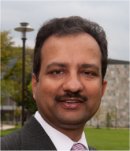|
Plenary
Lecture
Investigating the Viability of Hybrid and Electric
Automobiles by Understanding the Influence of Road
Design, Traffic Congestion, and Driver Behavior on
Vehicle Power Uses

Professor Manoj K. Jha
Center for Advanced Transportation and
Infrastructure Engineering Research
Department of Civil Engineering
Morgan State University
1700 East Cold Spring Lane, Baltimore, MD 21251
USA
E-mail: manoj.jha@morgan.edu
URL:
http://www.eng.morgan.edu/~mkjha
Abstract:
The generally upward trend in gasoline prices over the
past 10 years has prompted renewed interest in studying
the viability of hybrid and electric automobiles in the
years ahead. The vehicle power consumption depends on
many factors among which the most notable ones are road
design characteristics, traffic congestion, and driver
behavior. The amount of fuel or battery consumption,
which is a measure of vehicle power uses, depends on
such factors as vehicle acceleration/deceleration, road
configuration, and driver behavior.
In this presentation we formulate vehicle power uses as
a function of traffic and road design characteristics,
i.e., Vpu(i)=f(V,T,G), where Vpu is vehicle power uses
for the ith vehicle class, V is a vector representing
vehicle characteristics, T is a vector representing
traffic characteristics, and G is a vector representing
geometric characteristics of roadways. Using traffic and
roadway data from a congested highway network in the
Baltimore area we calculate the vehicle power uses for
different vehicle classes, traffic, and road conditions.
We then study the power consumption requirements of some
hybrid and electric vehicles and relate that to the
traffic and roadway characteristics, which will be a key
factor in designing future hybrid and electric vehicles.
We perform some sensitive analysis to investigate the
impact of vehicle, traffic, and geometric
characteristics of roadways on vehicle power uses. The
preliminary results indicate that older vehicles, higher
levels of traffic congestion, and aggressive driving
behavior generally require higher vehicle power uses
which in turn requires higher fuel and battery
consumption. Additional testing will be carried out in
future works. This project was funded through the
Department of Energy-Massie Chairs of Excellence Program
at the Morgan State University.
Brief Biography of the Speaker:
Dr. Manoj K. Jha is Professor and Founding Director of
the Center for Advanced Transportation and
Infrastructure Engineering Research (CATIER) in the
department of civil engineering at the Morgan State
University, Baltimore, MD, USA. His research interests
are in developing computational models for sustainable
transportation infrastructure design and route
optimization. For his scholastic and research
achievements he has received several awards, among which
are the 2010 best paper award by the Transportation
Research Board (TRB) for the paper entitled "Methodology
for Checking Shortcomings in the Three-Dimensional
Alignment," presented at the 4th International Symposium
on Highway Geometric Design, Valencia, Spain on June 2,
2010; 2008 National Science Foundation (NSF) Small
Technology Transfer Research (STTR) award; 2005 and 2006
United Negro College Funds Special Program/Department of
Defense (UNCFSP/DoD) Faculty Development Awards; 2005
Department of Homeland Security (DHS) Summer Faculty
Research award by the Study of Terrorism and Responses
to Terrorism (START) Center of Excellence, University of
Maryland, College Park, and 2005 NSF-PASI-TS (National
Science Foundation's Pan-American Advanced Study
Institute on Transportation Sciences) award by the
Rensselaer Polytechnic Institute.
Dr. Jha has authored (or co-authored) more than 120
peer-reviewed articles in journals, books, and
conference proceedings in the highway design,
infrastructure, optimization, and transportation
literature. He has also co-authored 3 books and
co-edited 14 books. He is an associate editor of the
Open Civil Engineering Journal, and editorial board
member of several international journals, including the
Journal of Infrastructure Systems, and the International
Journal of Operations Research and Information Systems.
He has delivered over 20 invited, keynote, and plenary
speeches at international conferences and institutions.
|
